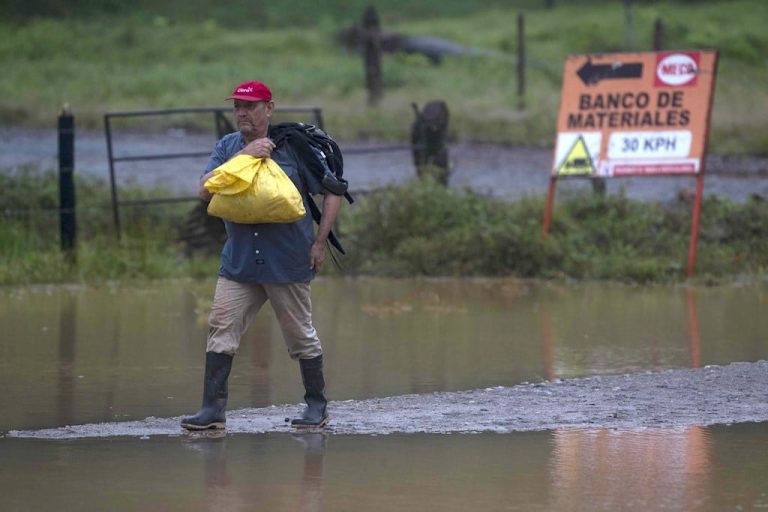11 de noviembre 2020

Children of Exile: The Births “Sowing Hope” in the Camp of Nicaraguan Farmers

PUBLICIDAD 1M
PUBLICIDAD 4D
PUBLICIDAD 5D
Daniel Ortega has politicized the collection of aid. They have forbidden business and social organizations to deliver aid to those affected by Eta

Eta brought days of heavy rains and flooding across Central America. Nicaragua and Honduras were especially hard hit. Central American authorities have reported more than a dozen deaths and widespread property damage. Photo: Jorge Torres / EFE
Labor organizations and opposition leaders in Nicaragua have opted to gather aid clandestinely for those displaced by Hurricane Eta. Their humanitarian effort went “underground” after the Ortega regime forbade the private collection of goods and medicine for hurricane victims. On Sunday, November 8th, the opposition Civic Alliance reported that they planned to continue their efforts.
“Yes, we’re doing it clandestinely. We were going to send the donation, but then the police surrounded [the collection centers]. We’re taking donations from individuals: children’s clothing, shoes, blankets, food. There’s a lot of solidarity,” Juan Sebastian Chamorro, executive director of the Civic Alliance, told the EFE press agency.
An official government report on the damage and the needs sparked by Eta is pending. The hurricane made landfall as a Category 4 storm on the Saffir-Simpson scale, with winds up to 155 m/h. Residents of the disaster zone have turned to social media to ask for help. They are in need of food, water, clothing and materials to reconstruct their homes.
Beginning Monday, November 2, the day before the hurricane hit, the private “Nicaraguan Medical Unity” began collecting medical supplies. However, when they learned of the group’s humanitarian efforts, the Ortega’s police blocked the gates of the organization’s main office.
Despite the obstruction from the authorities, the group continues to collect aid. We have to do this clandestinely, and await an opportune moment to get it to those who need it. This was the assertion of Dr. Anely Perez, the organization’s secretary.
“We’ve tried to continue collecting supplies. We’ve been doing this individually. There are a lot of doctors involved, each one on their own. We’re also collecting supplies needed for COVID-19. We’re going to send them whenever we can. It’s merely a humanitarian labor; we hope that it’s not affected or repressed,” Dr. Perez told EFE.
The Nicaraguan government hasn’t offered any explanation of their decision to forbid bringing aid to the North Caribbean Autonomous Region. This is the zone hit hardest by the hurricane. Parts of it are still unreachable by land, due to the rivers that overflowed.
“We know that what we’re doing isn’t a crime. It’s not a crime to exercise your profession in a humanitarian way, for people that need it. It’s a reality that’s hard to understand. Solidarity should be recognized, not persecuted,” Dr. Anely Perez commented.
Juan Sebastian Chamorro said: “This exposes still further the mentality of this dictatorship. It views everything in political terms. We’re making this denunciation public, so the world can know the Ortega dictatorship is forbidding donations. At the same time, it [the government] is asking for international aid. That seems unacceptable. It’s makes no sense. This should be an opportunity to support anyone who needs it, without any need to wave a flag.”
The obstruction of aid, and the need to collect it surreptitiously comes within the framework of Nicaragua’s ongoing socio-economic crisis. In 2018, massive anti-government demonstrations in Nicaragua were squelched through armed attacks. The repression left hundreds dead, missing or imprisoned. There were also thousands injured and tens of thousands forced into exile.
In recent weeks, persecution of opposition leaders has intensified. A series of laws has been approved, mandating prison terms for those the state considers guilty of threatening the internal order.
Archivado como:
PUBLICIDAD 3M
Agencia de noticias internacional con sede en Madrid, España. Fundada en Burgos durante la guerra civil española en enero de 1939.
PUBLICIDAD 3D